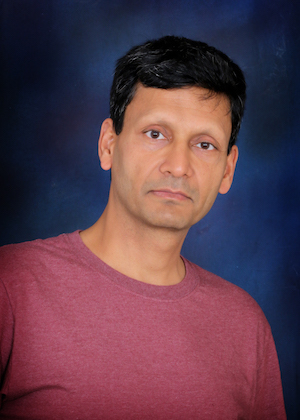LENS Innovate
Word Wallah
Alumnus Anu Garg Broadens Readers' Vocabularies - One Gem at a Time
 Anu Garg, Wordsmith.org founder
Anu Garg, Wordsmith.org founder
Growing up in rural northern India, Anu Garg (GRS '95, computer science) loved to read, but getting access to books was difficult. When he came to America to earn a master's degree at Case Western Reserve University in 1991, the library blew his mind. "When the librarian said I could take out 50 books, I thought she meant a year," he recalled. "She said, 'No, 50 at a time.' I was like a famished child put in a restaurant and told, 'Here, eat all you can.' "
A love of books developed into a love of words. Garg, who grew up speaking Hindi and learned English in sixth grade, wanted to know the story behind each word he was reading. The web was in its infancy then, and email seemed the perfect way to share his lexicological passion with others.
In 1994, while Garg was a Case Western Reserve student, he started a simple mailing list of one interesting word a day, beginning at the end of the alphabet with "zephyr," which means a gentle breeze. "There was no grand plan," he said, but by the end of the first year, he had 6,000 subscribers. Garg sends his "A.Word.A.Day," as his email came to be called, to more than 387,000 addresses. It, in turn, spawned a website, Wordsmith.org, and three books, the first of which was briefly a best-seller. The service has many loyal, decades-long subscribers who correspond with Garg about their favorite words.
For many years, Garg was a consultant for AT&T labs in Columbus, Ohio, before quitting to run his mailing list and website full time 15 years ago. He lives in Seattle and is working on a memoir, Word Wallah.
Like wallah, which means a person who works in a specific business, some of the words Garg features on his site evolved from Hindi. Half the languages spoken around the world come from Indo-European roots, Garg said. Candy, for example, comes from the Sanskrit word khand, meaning piece, and was adapted by the British to its current meaning. "As it traveled, it evolved," he said, "and the meaning became a little sweeter."
Garg consults at least a dozen dictionaries in researching words' etymologies. "The more convoluted the story is, the chances are it's a false etymology," he said.
Garg thinks about words like dear friends—they have family backgrounds and individual personalities. "Words are like people," he said. "We need to make an effort to get to know them."
As with friends, he is reluctant to pick favorites. His least favorites are words used to discriminate or belittle. "Language is a tool you can use to communicate, but also for destructive purposes," he said. "Words have so much power."
Garg also adores anagrams, or words that can be made by rearranging the letters of other words. Wordsmith.org features an anagram server, which generates anagrams for any words entered. "Listen," for example, is an anagram of "silent," while "Britney Spears" is an anagram of "Presbyterian." "
If you torture words enough," Garg said, "they'll confess to anything."
Wordsmithing by the Numbers
70+ countries have subscribers to the A.Word.A.Day email
387,000+ subscribers to the email
1.9 million page views a month at Wordsmith.org (where readers also can subscribe to the email)
5,419 unique words featured in the A.Word.A.Day email.
2 letters form shortest words featured: aa, id, nu, os, pi, rx, ye
45 letters form the longest word featured: pneumonoultramicroscopicsilicovolcanoconiosis
9,158 stories published in The Anagram Times (www.anagramtimes.com)
120 billion anagrams generated by the Internet Anagram Server (wordsmith.org/anagram)
1 mission: To spread the magic of words





